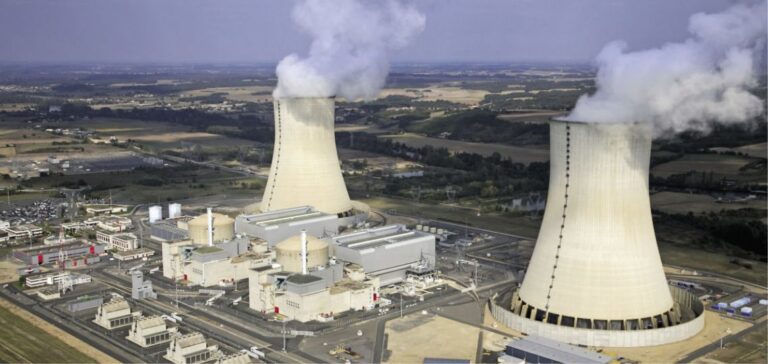To facilitate the construction of new reactors, the Parliament has definitively adopted Tuesday the bill to revive nuclear power, by a final vote of the National Assembly, where the cause of the atom is gaining ground. One week after a broad support of the Senate, the deputies voted the text by 399 votes to 100, with a coalition of votes from the presidential camp, LR, RN and communists.
Only the ecologist and LFI groups voted against. The PS, which had opposed the text in the first reading, abstained this time, after having described nuclear power as a “transition energy” towards renewables. The Minister of Energy Transition Agnès Pannier-Runacher praises a “major text” to “produce independent, competitive and low-carbon energy”, and calls for a “political consensus” on energy. In the morning, she had gathered in Paris about fifteen representatives of pro-nuclear European countries, in order to influence the “energy strategy” of the European Union.
Technically, the French bill simplifies the procedures in order to achieve Emmanuel Macron’s ambition to build six new EPR reactors by 2035, and to launch studies for eight others. It concerns new installations located in existing nuclear sites or nearby, such as Penly (Seine-Maritime), Gravelines (Nord)…
In the wake of the Senate, parliamentarians have lifted a lock introduced in 2015 under François Hollande, and already modified under Emmanuel Macron. The text thus removes the objective of reducing the share of nuclear energy in the French electricity mix to 50% by 2035 (initially 2025), as well as the ceiling of 63.2 gigawatts of total authorized nuclear production capacity. To the great displeasure of nuclear opponents, he is speeding up the future law on multi-year energy planning, expected at best this summer.
“Everything was done in disorder. (…) Only this programming law could decide whether or not to relaunch the nuclear industry,” said Maxime Laisney, a member of the French National People’s Party. The NGO Greenpeace and the network Sortir du nucléaire have not failed to protest: “the government puts the cart before the horse and acts a revival at forced march,” they denounce.
“Cultural battle”
Another sensitive point, the text toughens the penalties for intrusion in the power plants, with a penalty increased from one to two years in prison and a fine of 15,000 to 30,000 euros. In the Assembly, ecologists and LFI have fought against the bill, insisting on the “tons of waste” of nuclear power, and on the major crack on a backup circuit of a reactor in Penly, announced in early March.
Julie Laernoes (EELV) denounced the “unbridled hype to make the population forget the dangers of nuclear power and its technological and financial setbacks. Both parties are advocating for a phase-out of the atom and a switch to 100% renewable energy by 2045.
But twelve years after the Fukushima nuclear disaster in Japan, the ecologists recognize that they have lost ground in their “cultural battle” against the atom, just as polls show a growing support for nuclear power. In the Assembly, a parliamentary commission of inquiry led by the LR Raphaël Schellenberger and the Macronist Antoine Armand, openly pro-nuclear, pointed to a “political rant” for thirty years on energy issues.
Faced with the climate emergency, and after the fears of power cuts this winter against the backdrop of the war in Ukraine, “we must no longer be ashamed of nuclear power”, argues the Renaissance deputy Maud Bregeon, former EDF employee and rapporteur of the bill. On the right, the LR support the text while criticizing “the spectacular head-turning” of Emmanuel Macron on the issue.
As expected, parliamentarians did not reintroduce the controversial nuclear safety reform sought by the government. But the executive still considers it necessary to merge the Institute for Radiation Protection and Nuclear Safety (IRSN), a technical expert, into the Nuclear Safety Authority (ASN), the watchdog of the power plants, despite the protests of the unions.
And in the joint committee, the deputies and senators removed an amendment voted in the Assembly that aimed to prevent any merger by guaranteeing a dual organization between IRSN and ASN. This nuclear text follows a law to accelerate renewable energy, adopted in February.





















